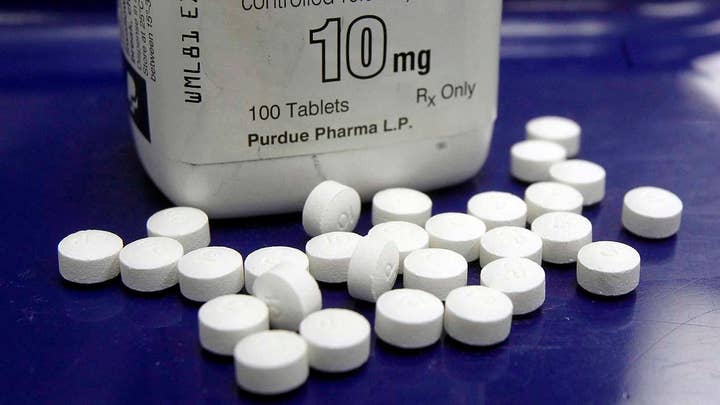Mom of football player who died of prescription drug overdose says manufacturers are to blame, not doctors
The mother of a college football player who died in 2011 from a prescription drug overdose speaks out on the trial against Johnson & Johnson in Oklahoma.
An Oklahoma mother whose son died of a prescription opioid overdose said that pharmaceutical companies are to blame for the opioid crisis, not doctors, ahead of a landmark civil case in her home state.
Gail Box's son Austin, a football player for the University of Oklahoma, died in 2011 after overdosing on opioids he was prescribed to treat pain from sports injuries.
As a major lawsuit against America's largest drug manufacturer, Johnson & Johnson, is set to begin on Wednesday, Box argued that Big Pharma needs to be held accountable for the way they have marketed opioids to Americans.
"I absolutely hold the companies responsible," Box told "Fox & Friends" hosts on Tuesday morning. "They were not telling the doctors the truth in regard to how addictive these medications were. I think they were telling doctors that maybe one percent of people could possibly become addicted," she continued.
Her argument is in line with many states and counties who have called for companies like Johnson & Johnson and Purdue Pharmaceuticals to face consequences for marketing tactics that led to the widespread overprescription of opioids.
COLORADO SIGNS BILL ALLOWING DOCTORS TO RECOMMEND MEDICAL MARIJUANA INSTEAD OF OPIOIDS
However, some judges have disagreed, and Purdue Pharma recently secured a major win in North Dakota, when it was ruled that the company could not control how doctors prescribed their medications or how patients reacted to them.
This does little to comfort Austin's parents. Gail told "Fox & Friends" that in her son's case, the compounding factors of several football-related injuries and subsequent surgeries made Austin "mentally and physically vulnerable" to opioid abuse.
"Around Austin, it was a perfect storm of events," Box continued. "The opioids provided a feeling of well-being and helped him through his pain."
Johnson & Johnson is the only remaining defendant not to settle with the state of Oklahoma in the current bench trial, during which time a judge will rule without the presence of a jury. Experts believe the result of the case will set a precedent for the decisions made in future lawsuits against pharmaceutical companies, according to NPR.
EXCLUSIVE: U.S. DRUG CZAR TO TRAVEL TO CHINA TO PRESS GOVERNMENT TO STOP FENTANYL TRAFFICKING
Box said she hopes that in Oklahoma, the conclusion of the lawsuit against Johnson & Johnson will lead to more funding for research and treatment into opioid abuse.
"We need to have money in Oklahoma for treatment," she said.
CLICK HERE TO GET THE FOX NEWS APP
"We do not have enough treatment beds in Oklahoma. And I'm hoping that any money that could be gotten through this lawsuit could be used for treatment, for research, for helping families."



